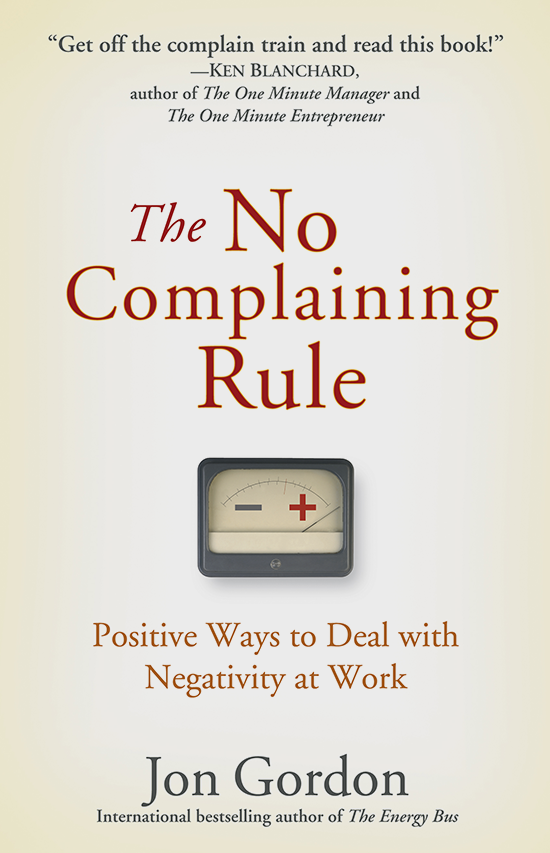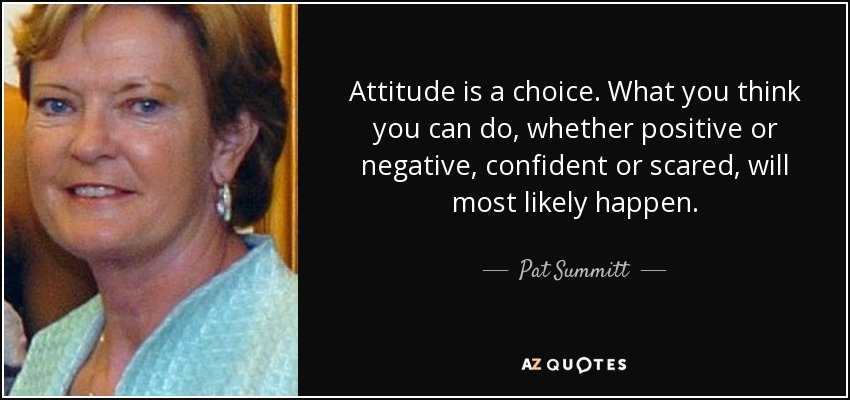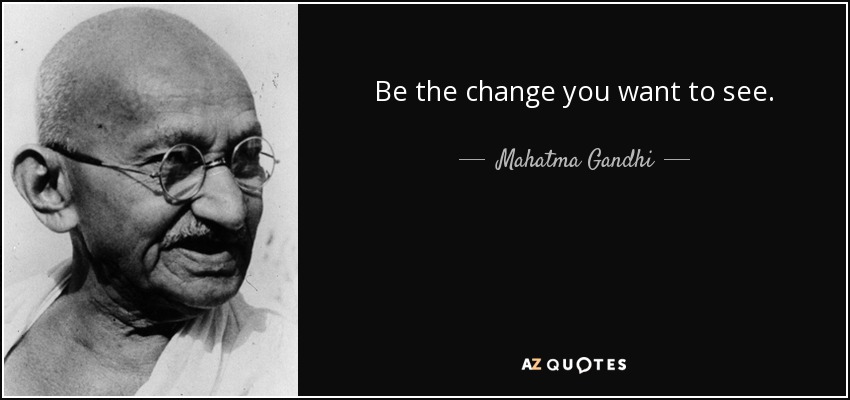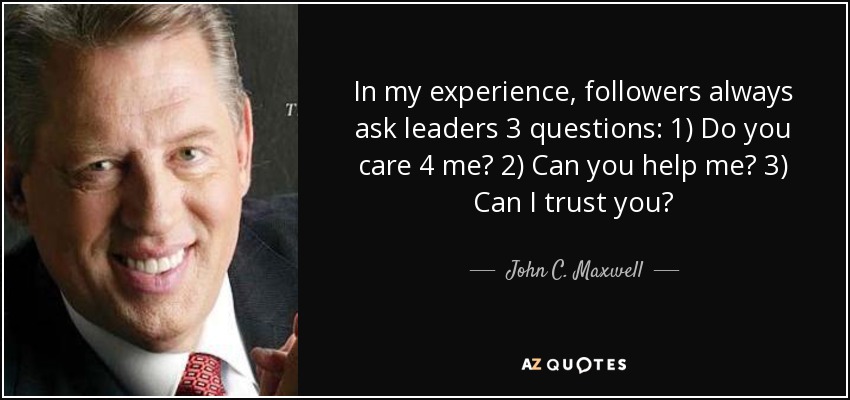Click here to return to Blog Post Intro

Complaining and negativity are cancer to an organization. Every one of us will face negativity, energy vampires, and obstacles on the road to success. That is why one of the most important things we can do in business and life is to stay positive with strategies that turn negative energy into positive solutions.
The goal is to turn justified complaints into positive solutions. After all, every complaint represents an opportunity to turn something negative into a positive.
Within every organization you get voids in communication between leaders and their employees and between different teams and team members. It happens everywhere: with sports teams, work teams, family teams. Within these voids, negativity starts to breed and grow and, eventually, like a cancer it will spread if you don’t address it.
Negativity costs the U.S. economy between $250 to $300 billion every year in lost productivity, according to the Gallup Organization. Ninety percent of doctor visits are stress related, according to the Centers for Disease Control & Prevention, and the #1 cause of office stress is coworkers and their complaining, according to Truejobs.com.
Too many negative interactions compared to positive interactions at work can decrease the productivity of a team, according to Barbara Fredrickson’s research at the University of Michigan.
Negative emotions are associated with the following:
- Decreased life span and longevity
- Increased risk of heart attack
- Increased risk of stroke
- Greater stress
- Less energy
- More pain
- Fewer friends
- Less success
People complain either: (1) because they are fearful and helpless or (2) because it is a habit.
In life you have a choice between two roads: the positive road and the negative road. The positive road will lead to enhanced health, happiness, and success and the negative road will lead to misery, anger, and failure.
Former Notre Dame Football Coach Lou Holtz said, “Don’t complain. Eighty percent of the people you complain to don’t care and 20 percent are glad you have problems.”
When we complain, we feed the negativity.
As a practical step to combat negativity, try a No Complaining Day, or what Jon Gordon calls a complaining fast. Quit cold turkey. It’s great because it causes you to monitor your thoughts and realize how negative you really are.
You’ll get to a year eventually. But start with a day. Then go for a week. Then a month, then a year. Like any bad habit, it’s a one day at a time thing. Remember change begins with you.
When you do complain, because you most certainly will—everyone does—use your complaining to your advantage. You see, every complaint has an opposite. If there is something you don’t like, then there is something you do like. Every complaint represents an opportunity to turn something negative into a positive. We can use complaining as a catalyst for positive change in our own lives, at work, and in the world.
Three No Complaining Tools
- The But → ___ Positive Technique. This simple strategy helps you turn your complaints into positive thoughts, solutions, and actions. It works like this. When you realize you are complaining, you simply add the word but and then add a positive thought or positive action.
- Focus on “Get To” instead of “Have To.” Too often we complain and focus on what we have to do. Focus on what you get to do. Focus on feeling blessed instead of stressed. Focus on gratitude.
- Turn Complaints into Solutions. The goal is not to eliminate all complaining. The intent is to eliminate the kind of mindless complaining that doesn’t serve a greater purpose and allow complaining that is justified and worthwhile.
One person can’t make a team, but one person can break a team. And worse, negative people can scare away every customer you have. Sometimes as a leader, you have to rid your team of cancerous people.
Staying positive is not about putting on a fake smile or believing you can do it all yourself. Rather it’s about being optimistic and living with hope and having faith. The measure of our success will not be determined by how we act during the great times in our life but rather by how we think and respond to the challenges of our most difficult moments.
Successful, positive companies with positive employees and positive cultures are created like anything else. Through a set of principles, processes, systems, and habits that are ingrained in the corporate culture and each individual employee. Positive companies aren’t born. They are developed. They relentlessly focus on culture and weeding out negativity.
Positive energy flows from the top down in our organization. It trickles up and moves sideways, but it flows from the top down. Positive leadership is essential.
We must relentlessly make our culture and people a priority at all levels of our organization. It’s like the root and fruit of a tree. The root, which is our culture, people, and spirit must be our focus. Instead of focusing so much on the fruit—profits, stock price, and numbers—let’s relentlessly nurture our root. If we do this, we will be very pleased with our fruit.
Because people deliver the numbers, people should be our focus, and if we focus on them they will deliver the numbers we want.
Winning is the by-product of great effort, leadership, coaching, teamwork, and positive energy. It really is the secret to winning.
Trust is key.
As leaders, we need to listen to people and empower them to create solutions.
Work groups with positive to negative interaction ratios greater than 3:1 are significantly more productive than teams that do not reach this ratio. Research by Barbara Fredrickson from the University of Michigan that shows if a work group in a company experiences a positive to negative interaction ratio of 13:1, the work group will be less effective. This implies that no one is willing to confront the real problems and challenges that are holding them back. Sometimes we need to confront a situation to move past it and, as we know, ignoring problems that stare us in the face doesn’t work. Negative interactions are necessary as long as they occur much less frequently than positive interactions.
The No Complaining Rule
The No Complaining Rule says this, “Employees are not allowed to mindlessly complain to their coworkers. If they have a problem or complaint about their job, their company, their customer, or anything else, they are encouraged to bring the issue to their manager or someone who is in a position to address the complaint. However, the employees must share one or two possible solutions to their complaint as well.”
Trust is a significant component of the No Complaining Rule. Leaders and managers must foster the trust of their employees so that employees feel comfortable sharing their complaints and ideas with them. If we are going to prohibit mindless complaining, then it is essential that we provide an outlet and process of communication for our people to share their complaints, ideas, and solutions. Our employees must know we listen to them, hear them, care about them, and will seriously consider their ideas. If we are going to discourage negative behavior and complaining, then we must do everything possible to encourage positive behavior and positive communication.
Each executive and manager is expected to keep a list of complaints and solutions presented by their employees. They implement obvious solutions within their domain and control. For the suggestions that cannot be resolved immediately or are not within their domain or control, they present them either at a managers’ meeting or at a quarterly meeting.
Here are five practical things to do instead of complain:
- Practice Gratitude. Research shows that when we count three blessings a day, we get a measurable boost in happiness that uplifts and energizes us.
- Praise Others. Instead of complaining about what others are doing wrong, start focusing on what they are doing right. Praise them and watch as they create more success as a result.
- Focus on Success. Start a success journal. Each night before you go to bed, write down the one great thing about your day.
- Let Go. Focus on the things that you have the power to change, and let go of the things that are beyond your control.
- Pray and Meditate. Scientific research shows that these daily practices reduce stress; boost positive energy; and promote health, vitality, and longevity.
Consider a No Complaining Week
Post NO COMPLAINING, SOLUTIONS WANTED, and STAY POSITIVE posters in your office, home, or locker room.
A No Complaining Week is a fun but very powerful way to ingrain the rule into the habits of each person and the culture of the organization.
Offer some practical tips for the week:
- Make a Gratitude List. When you find yourself wanting to complain, focus on what you are grateful for instead.
- Take a Thank-You Walk. While you’re walking, think of all the things you are grateful for.
- Focus on the Good Stuff. Focus on what you get to do versus what you have to do.
- Let Go: Make a list of the things you would like to complain about. Go through this list and identify the things that are within your control that you have the power to change and identify those things that are beyond your control.
- Breathe: Spend 10 minutes in silence. Focus on your breathing while praying or meditating and transform stress into positive energy.
- Say some affirmations. These are positive sentences about you or your circumstances that can give you boldness, confidence and self-esteem.
- Hang around with positive people.
- Read or watch positive, motivational books and movies.
- Be kind to someone today.
Finally, the best thing you can do for yourself and others, today and everyday is to simply smile.
May your celebration of Positive Thinking Day bring you renewed optimism, as you shoot for the stars!




